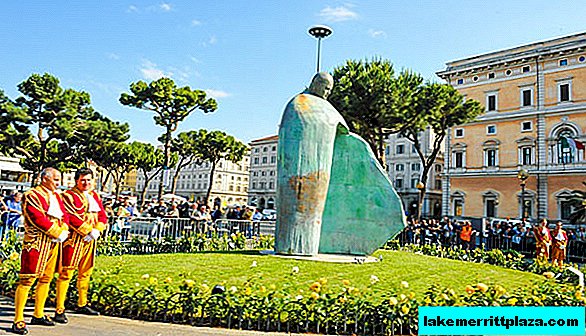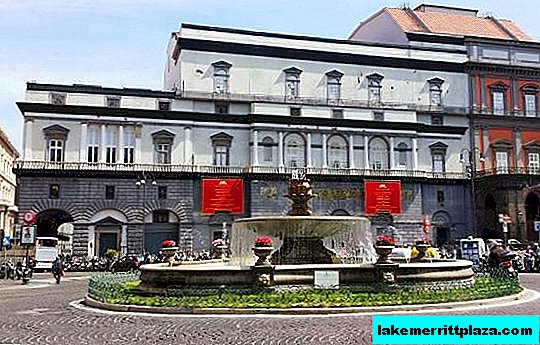Works of literature, sculpture, applied art tell about the customs of the inhabitants of Ancient Rome, they can be judged on the basis of preserved business and friendly letters, works of historians and philosophers.
Heyday
The power of Ancient Rome is associated with important ideals and principles that have been brought up in every free citizen from early childhood:
- Allegiance to the state;
- Serving the community;
- Harmony of mind and body;
- The ideals of beauty and love, etc.
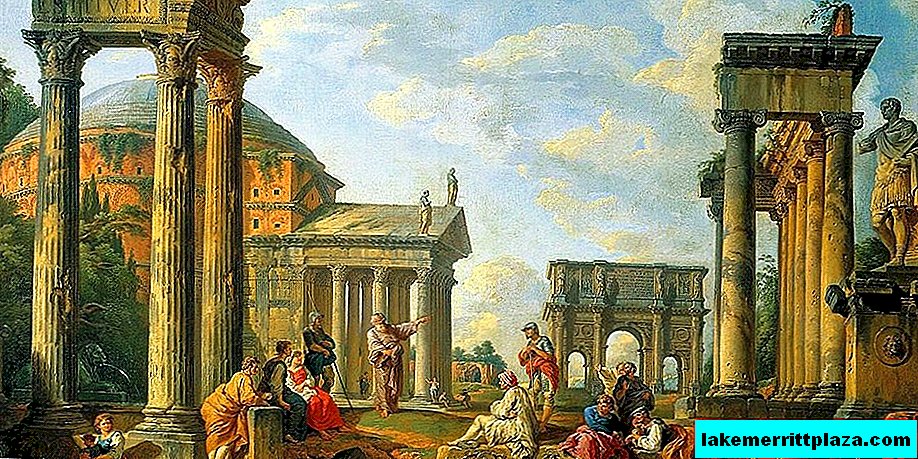
One of the principles of life is loyalty to friendship, which acted as the basis of the relationship. Communication with friends took a lot of time: meetings, conversations, family and friendly celebrations, mutual services and assistance in the business, military sphere. Friendship was associated with the concepts of nobility, mutual assistance, kindness, cordial affection.
The ancient world is associated with the ability to have fun. If for the lower strata of the population, the best entertainments were folk holidays and festivals, visiting zucchini and taverns where you could drink, have a meal and gossip, then the higher intellectual strata of the population preferred other entertainments:
- Fashionable in the heyday of Rome, reading poetry and treatises;
- Philosophical conversations;
- Sports competitions (competitions on chariots, in rowing, running, etc.).
If we talk about the period of the decline of Rome, it will be necessary to note the general moral decline.
Decline
The luxury and wealth of the upper classes during the period of empire strengthening led to the disappearance of modesty and frugality, the appearance of unbridledness and arrogance. Idleness and idleness, an awareness of power and strength in the absence of an external threat created the illusion of unlimited power and permissiveness. The principles of life are profit, wealth, increase of possessions, income through the use of official position.
The top of society is building itself large, richly furnished villas, which were bursting with the amount of gold things, expensive clothes, women's jewelry, outlandish animals overseas, etc. The family is valued less and less, the Romans do not want to have children, thinking only of their own pleasures and considering the family an unnecessary burden.
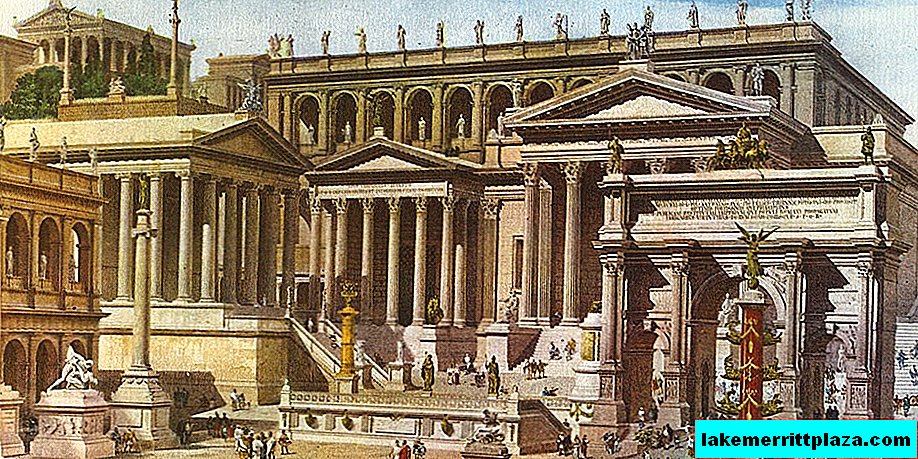
Among the poor, the family also ceases to be a value and support. In the period of the decline of the empire, it is common to plant and sell children.
Gluttony
Among the upper circles gluttony began to flourish. If in earlier times the Romans ate, along with the servants, one and the same simple food, now the gentlemen are eating separately. Gourmet, plentiful dishes and drinks are prepared for them. Among servants, the number of cooks, bakers, confectioners is growing.
They ate food while lying down, stripping to the waist, so that they “fit better”, they ate with their hands. If the food ceased to fit in the stomach, it was spewed out and eaten again.
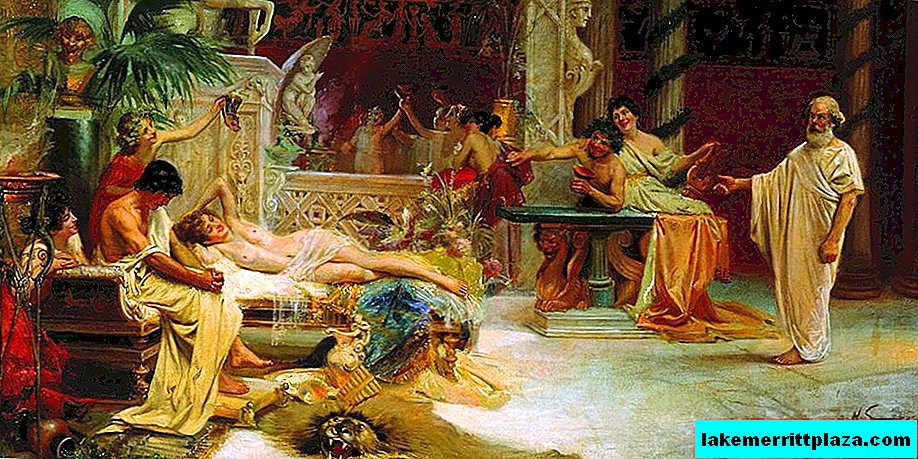
Magicians and dancers performed in front of the feasts, women of easy virtue served the obese oligarchs. The feasts were attended by wives and children, who participated equally with men in gluttony, drunkenness and debauchery.
Spectacles and blood
A large amount of funds: both state and personal funds of large officials - was spent on organizing entertainment for the people, famous shows. The number of days off amounted to more than a third of the days in a year. Entertainment for most of the crowd was free, only rich people paid for VIP seats.

From entertainment they expected sophisticated cruelty. The battles of gladiators in the Coliseum were valued the higher, the more blood of people and animals rushed on them. If the entertainment was not pleasant, they brutally tortured and killed its organizer.
Wine and women
The favorite pastimes of rich people are not books and philosophical conversations, but wine and women. Instead of a family, numerous erotic connections are made, which did not require the manifestation of responsibility and care. Voluptuousness was satisfied with connections with minors, perverted connections between the sexes, incestuous connections became common. To extend the pleasures, noble families refused to have offspring, women took any measures so that pregnancy did not disfigure their figures, and motherhood did not deprive freedom and idleness.
Normal relationships between husband and wife are becoming rare and are being ridiculed by many. The result was not only the moral, but also the genetic decline of the nation. Sexually transmitted diseases and impotence as a result of erratic relationships and excesses become commonplace.
Debauchery and cynicism penetrate literature, theater, and are reflected in works of decorative art.
Debauchery and prostitution
In pursuit of pleasures, not only men rushed, but also women from noble families. It has become fashionable to have a brothel, engage in prostitution. This craft was not shameful, it existed completely openly.
National holidays were dedicated to the gods Priapus, Venus, Isis, they were attended by representatives of the upper and lower classes, priests, men, women and children quite openly and on equal terms.
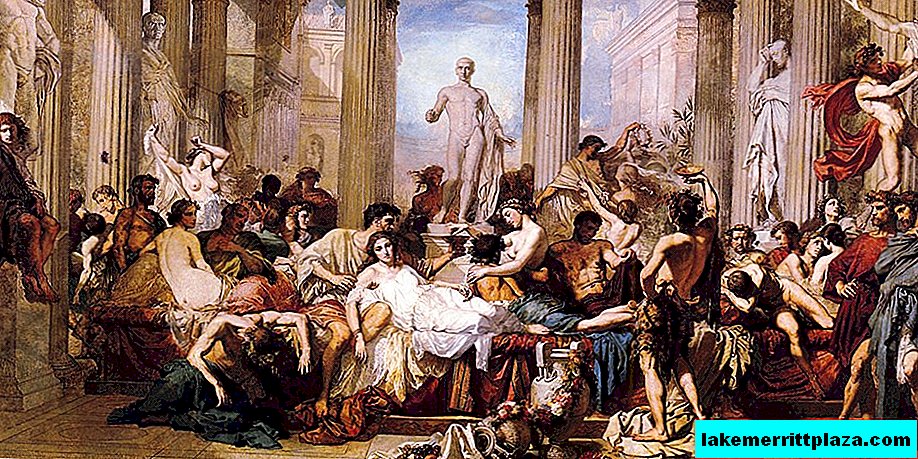
In the cities there were several brothels, and free courtesans were also popular, inviting people to their homes or inviting clients in the streets, near churches, in public places.
For prostitution, a lower or middle class woman required registration and tax. This business was served by barkers, midwives, attendants, masseurs, doctors, who made special formulations to maintain arousal. And the wealthy courtesans behaved openly and arrogantly, boasting of jewels, slaves and noble admirers.
The place where universal debauchery flourished was the city baths - thermae. During the decline of Rome, they were common to men, women and children, well-lit, and obscene action took place in large pools and around them.
One of the directions of habitual debauchery was male prostitution, almost as popular as female.
Thinking about the reasons for the fall of Ancient Rome, we can confidently say that one of the good reasons is the gradual decline in morals, the loss of high ideals, faith in the state, beauty, family.

